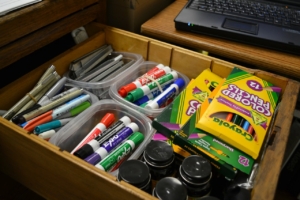This article was published by the IRS.
 The Internal Revenue Service is reminding teachers and other educators planning ahead that they’ll be able to deduct up to $300 of out-of-pocket classroom expenses when they file their federal income tax return next year.
The Internal Revenue Service is reminding teachers and other educators planning ahead that they’ll be able to deduct up to $300 of out-of-pocket classroom expenses when they file their federal income tax return next year.
This is the first time the annual limit has increased since the special educator expense deduction was enacted in 2002. For tax-years 2002 through 2021, the limit was $250 per year. This means for people currently filing their 2021 tax returns due in April, the deduction is limited to $250. The limit will rise in $50 increments in future years based on inflation adjustments.
For 2022, an eligible educator can deduct up to $300 of qualifying expenses. If they are married and file a joint return with another eligible educator, the limit rises to $600. But in this situation, not more than $300 for each spouse.
Who qualifies?
Educators can claim this deduction, even if they take the standard deduction. Eligible educators include anyone who is a kindergarten through grade 12 teacher, instructor, counselor, principal or aide in a school for at least 900 hours during the school year. Both public- and private-school educators qualify.
What’s deductible?
Educators can deduct the unreimbursed cost of:
- Books, supplies and other materials used in the classroom.
- Equipment, including computer equipment, software and services.
- COVID-19 protective items to stop the spread of the disease in the classroom. This includes face masks, disinfectant for use against COVID-19, hand soap, hand sanitizer, disposable gloves, tape, paint or chalk to guide social distancing, physical barriers, such as clear plexiglass, air purifiers and other items recommended by the Centers for Disease Control and Prevention (CDC).
- Professional development courses related to the curriculum they teach or the students they teach. For these expenses, it may be more beneficial to claim another educational tax benefit, especially the lifetime learning credit. For details, see Publication 970, Tax Benefits for Education, particularly Chapter 3.
Qualified expenses don’t include expenses for home schooling or for nonathletic supplies for courses in health or physical education. As with all deductions and credits, the IRS reminds educators to keep good records, including receipts, cancelled checks, and other documentation.
